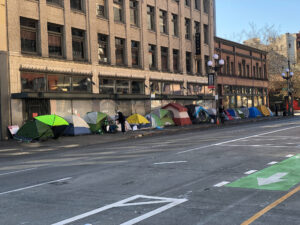
Over half a million people are unhoused in America. And when caring for those experiencing homelessness, a cell phone is Ebony Funches’ best friend. In fact, she often brings two so she can have a backup if something happens to her personal phone.
“If you’re under a freeway overpass or you’re in an alley, who would want to take a laptop in addition to a backpack that I’m carrying, [and] a stool to provide medical services?” Funches, a doctor of nursing practice at Los Angeles-based Venice Family Clinic, said Tuesday during a session at the HIMSS 2023 conference in Chicago. “I’m literally carrying what you see when you go into the doctor’s office — all of that is in my backpack. I want to have something as small as possible.”
On her phone is Venice Family Clinic’s mobile app, which doesn’t require internet connectivity (often a barrier when providing street medicine). The app allows her to take pictures of patients and their documents. She can also create a chart and speak into the phone so it dictates her voice, which is an important feature because sometimes she’s seeing up to 10 patients in a visit.
“I need to be able to chart very, very fast and having this allows me to do so,” she said.
Mobile apps seem built for this kind of care outside the clinic.
Funches’ co-panelist, Anthony Villanueva, chief information officer of Nashville-based Federally Qualified Health Center Neighborhood Health, said his organization also uses a mobile app when providing care to unhoused people. It allows providers to register patients electronically and also has speech-to-text technology that makes it easier for providers to take notes. In addition, if a patient requires care from a clinician who’s not there, the provider who is there can arrange for a telehealth visit that can be conducted through the mobile app.

A Deep-dive Into Specialty Pharma
A specialty drug is a class of prescription medications used to treat complex, chronic or rare medical conditions. Although this classification was originally intended to define the treatment of rare, also termed “orphan” diseases, affecting fewer than 200,000 people in the US, more recently, specialty drugs have emerged as the cornerstone of treatment for chronic and complex diseases such as cancer, autoimmune conditions, diabetes, hepatitis C, and HIV/AIDS.
As an example of a time her cell phone came in handy while providing street medicine, Funches told the story of a patient who had a large wound.
“I didn’t have much information, but I had my phone and enough demographics to create a chart and I would just take pictures of his wound and deliver wound care every week,” Funches said. “Each time, I would take a picture using the mobile app. There were other teams engaging with him on those two days that I’m not there so they could see that the wound was healing and what I was doing and kind of follow the treatment plan. Eventually the wound healed and the patient was able to get engaged with other services.”
How are these services paid for? About 30% of patients who are unhoused are eligible for some kind of insurance, Villanueva said. In addition, clinics can receive grant funding and donations, especially if they can show data that proves the effectiveness of their care.
“We were able to show several of our [managed care organizations] in Tennessee that we could reduce ED visits and stay with that particular population if we provide these medical services,” Villanueva said. “That opened the door for additional grants.”
When talking with stakeholders who can provide donations and grants, Funches added that sharing patient stories is extremely powerful. Sometimes, the clinic will even invite former patients who are now housed to discuss their experience.
“It’s better than any PowerPoint that we can do because it really shows that you can change someone’s life,” she said.
Photo: 400tmax, Getty Images













